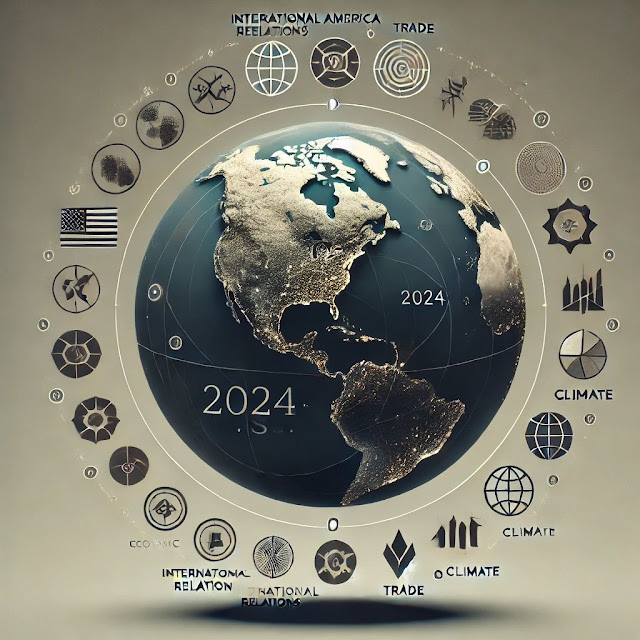With Donald Trump’s re-election in 2024, the world is poised to experience significant shifts across political, economic, and environmental spheres. Known for his "America First" approach, Trump’s policies prioritize U.S. interests with a strong focus on economic nationalism, skepticism toward global institutions, and limited regulation, particularly on environmental issues. This blog delves into the potential consequences of Trump’s leadership on the global stage, especially in areas like international relations, climate policy, and economic partnerships.
1. Foreign Policy: Shifts in Alliances and Rising Tensions
Trump’s return to office signals a re-emphasis on the "America First" philosophy, which often involves questioning the value of longstanding alliances. During his previous term, Trump frequently challenged NATO allies to increase defense spending and placed tariffs on goods from Europe and Asia, leading to tension with close partners. This time around, similar approaches may further strain relations with allies, who could increasingly seek partnerships that circumvent U.S. influence.
Key Points:
- NATO and Defense Commitments: Trump has historically questioned NATO’s effectiveness, which could weaken U.S. involvement and place greater strain on European allies. If Trump pushes for reductions in defense commitments, NATO members may need to bolster their own defense strategies, possibly leading to a shift in the balance of power in Europe.
- Trade and Tariffs: Trump's protectionist stance is likely to impact trade, especially with countries like China, the EU, and Mexico. New tariffs could disrupt global supply chains, causing economic uncertainty and potential inflation in multiple regions.
2. Climate Policy: A Retreat from Global Climate Action
Under Trump’s leadership, the U.S. previously withdrew from the Paris Climate Agreement, a move that placed the U.S. at odds with global climate action. Given Trump’s skepticism about climate science, his administration is expected to prioritize fossil fuel production and reduce regulations on carbon emissions. This stance is likely to have ripple effects on international climate initiatives.
Key Points:
- Impact on Global Climate Agreements: Trump’s policies may discourage other countries from setting aggressive climate goals. Without the U.S. taking a leadership role in emissions reduction, countries like China and India may delay stricter climate actions, potentially leading to a slower global response to climate change.
- Environmental Deregulation: Domestically, Trump’s focus on deregulating industries, particularly energy and agriculture, could lead to increased emissions. This rollback of environmental policies may undermine global efforts, as other nations might reconsider their commitments when the world’s second-largest emitter is taking a backseat.
3. Economic Policy: The Return of Economic Nationalism
Trump’s economic policies often focus on boosting domestic manufacturing and reducing dependency on imports, which is central to his America First strategy. His re-election may reinstate higher tariffs on imported goods and foster an environment of economic isolationism. This approach could impact both the U.S. economy and its global trading partners, particularly those heavily reliant on exports to the U.S.
Key Points:
- Impact on Global Trade: Trump’s tariff policies are likely to disrupt the established supply chains that many countries rely on, impacting sectors such as technology, agriculture, and manufacturing. Countries dependent on trade with the U.S. may have to look for alternative markets or renegotiate terms.
- U.S. Dollar and Global Markets: Any significant shift in U.S. trade policies can affect the global financial market. The uncertainty surrounding tariffs and trade restrictions may lead to market volatility, affecting both emerging and developed economies.
4. Global Perception and Leadership: Erosion of U.S. Influence?
Trump’s approach to international diplomacy, characterized by an emphasis on nationalism over multilateralism, could alter how other nations view U.S. leadership. By withdrawing from global issues and focusing on internal interests, the U.S. risks losing its influence over key issues such as human rights, global health, and security.
Key Points:
- Leadership in International Organizations: Trump’s withdrawal from international agreements and organizations during his previous term, such as WHO and the Paris Agreement, signaled a shift away from global cooperation. His re-election may embolden countries that prefer a non-interventionist approach, reshaping organizations like the UN and WHO.
- Shift to Regional Alliances: Without U.S. support, other nations may strengthen their regional alliances, creating new political and economic blocs. This shift could redefine the power dynamics on issues like technology standards, defense, and trade policies.
5. Conclusion: Preparing for a New Global Landscape
Trump’s re-election marks a return to an administration that prioritizes domestic interests over global collaboration, which may lead to both direct and indirect consequences worldwide. As countries grapple with potential shifts in trade, climate policies, and alliances, the global landscape may experience increased polarization. In the absence of U.S. leadership on climate and multilateral cooperation, other nations will likely need to adjust their strategies, potentially leading to a more fragmented and less coordinated international order.
Call to Action: The coming years will reveal how Trump’s "America First" policies impact global stability and climate goals. The question remains whether other nations can fill the gaps left by U.S. policy shifts. As readers, staying informed and engaged with these developments is critical in understanding how global dynamics might evolve in response to a changing U.S. foreign policy.
This analysis underscores the importance of recognizing how shifts in U.S. leadership reverberate globally, affecting everything from economic partnerships to climate action.
#USElection2024 #Trump2024 #GlobalPolitics #AmericaFirst #InternationalRelations
#USForeignPolicy #ClimatePolicy #PoliticalAnalysis #USPolitics #EconomicPolicy
#RepublicanVictory #ElectionOutcomes #Nationalism #TradeAndTariffs #saosiamfood #saosiam

Comments
Post a Comment